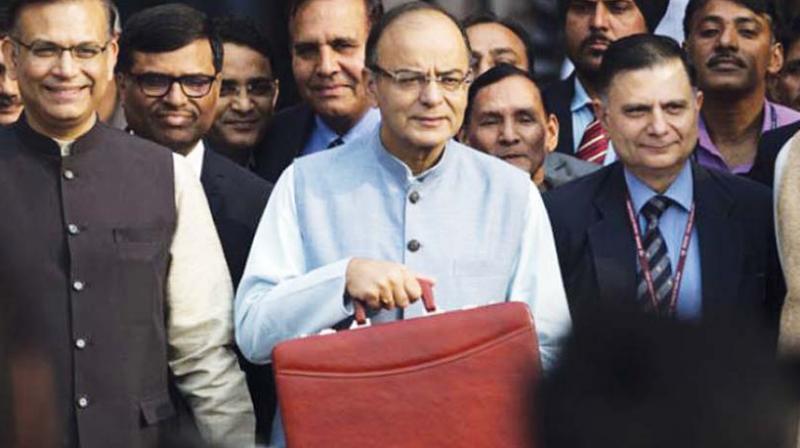Arun Jaitley's many-sided federalism, another wake up call to States

Chennai: In an unusual first this year, Union Finance minister Mr. Arun Jaitley has been in the limelight for his pervasive imprint in the ‘Economic Survey (ES-2016-17)’, as much as he was the cynosure of all eyes in his first post-demonetisation Budget for 2017-18, presented a day later as is the custom.
And two most important proposals – one came in the Budget and the other in the ES document- the decision to do away with the distinction between plan and non-plan expenditure and the FM broadening the very ambit of federalism respectively—, have huge implications for the States given our polity’s federal structure.
With the Planning Commission (PC) already having given way to the ‘Niti Aayog’ under the BJP dispensation, the abolition of the distinction between plan expenditure, which originally meant development expenditure, and non-plan expenditure which usually included items like salaries, subsidies, devolution to States etc., now implied that all budgetary allocations would be handled by the Finance Ministry itself.
The proposal to eliminate this distinction had been around since the late 1990s’ and once the present Budget is passed, the States too would have to make corresponding changes in their mode of accounting, as the overall objective has been to reduce the ‘revenue account’ deficits to help rein in the overall fiscal deficit at both Centre and the States.
However, this decision implies much more for the fiscal autonomy of the States as subsidies for instance could now be drastically slashed or withdrawn by the Centre, as in the case of sugar under PDS already. The Centre now has the added justification of higher level of overall transfers to States as per the 14th Finance Commission recommendations.
In the Tamil Nadu context, neither the ruling AIADMK nor the main opposition DMK is yet to make their position clear on the abolition of this plan-non-plan expenditure distinction. But it would not square with either of the main Dravidian parties’ sustained arguments for long years on the need for more resource transfers from the Centre to the States. Even as late as 2012, former Chief Minister, J Jayalalithaa at the famous NDC meeting from which she stormed out, banged the Centre for its “big brotherly and undemocratic approach” superimposing ‘dubious’ policies and programmes on States.
Mr. Jaitley’s second proposal, made in the ES, seems to unwind a bigger challenge to the States in a federal set-up. In the section on ‘From Competitive Federalism to Competitive Sub-Federalism: Cities as Dynamos’, a chapter that the Finance Minister himself penned for the Economic Survey as reported, he asserts that cities will be the major engines of growth in future and “urbanisation will define the trajectory of the country’s GDP”.
The ES is categorical that empowering cities, in the context of rising urbanisation, “is critical, but the political economy challenges from State governments are considerable.”
From a simple and straight understanding of greater devolution of powers including financial powers as the cornerstone of better Centre-State relations in addressing concerns of both regional imbalances and equity amid growth, this was as an aspect that first engaged the first DMK government here. A committee headed by Justice Rajamannar thoroughly looked into the issues related to autonomy and more powers to the State. The committee’s recommendations were further distilled by a sub-committee, when Mr M Karunanidhi was CM in the early 1970s’, comprising the late Murasoli Maran and Constitutional expert, Era Sezhiyan, that Tamil Nadu earned the distinction of flagging the federalism/autonomy issue in a big way in the national scene.
Then came the appointment of the Justice Sarkaria commission on Centre-State relations, which again made wide-ranging and comprehensive recommendations at a time States feared over-centralization by New Delhi. Significantly, there was a marked shift in emphasis in the federalism debate when coalitions became the norm at the Centre since the mid-1990s’.
For the first time in the history of Indian planning, under the then United Front (UF) government headed by Mr. Deve Gowda as PM, the draft approach paper to the ninth plan (1997-2002) placed before the National Development Council (NDC) meeting in January 1997, introduced a chapter on ‘Cooperative Federalism’. Mr Karunanidhi, as CM representing Tamil Nadu then, went on record to hail this new terminology as “according due recognition to the role of the States in Nation building.” It fitted with the larger trend of the party leading a Central coalition dependent on clutch of regional parties, including TDP leader N Chandrababu Naidu from Andhra Pradesh.
Post the Narendra Modi-led victory for the BJP in the 2014 Lok Sabha polls, the federalism debate has leapt into another space altogether, with the Prime Minister emphasising on ‘Niti Aayog’ articulating the aspirations of a new ‘Team India’ wherein States too have to play their part as team members, ‘competitive federalism’ in a word.
The latest ES 2017 goes even a step further urging that competition between
States “must be extended to competition between cities”. The Centre’s new flagship programmes like the ‘Smart Cities Mission’ and ‘Swachh Bharat Mission’ partly reflect this idea of cities competing amid themselves to get a share of the pie and being accountable for it by delivering specific outcomes within a timeframe.
The Finance minister acknowledges that this raises fresh issues of how much the State capitals would devolve more powers to urban local bodies. But for him, eventually, by empowering the cities and their mode of governance, “to competitive federalism, India must add competitive sub-federalism.” Are States ready to play ball vis-à-vis this new dimension to the federal debate without feeling their sovereignty is shrinking, is a million dollar question.

